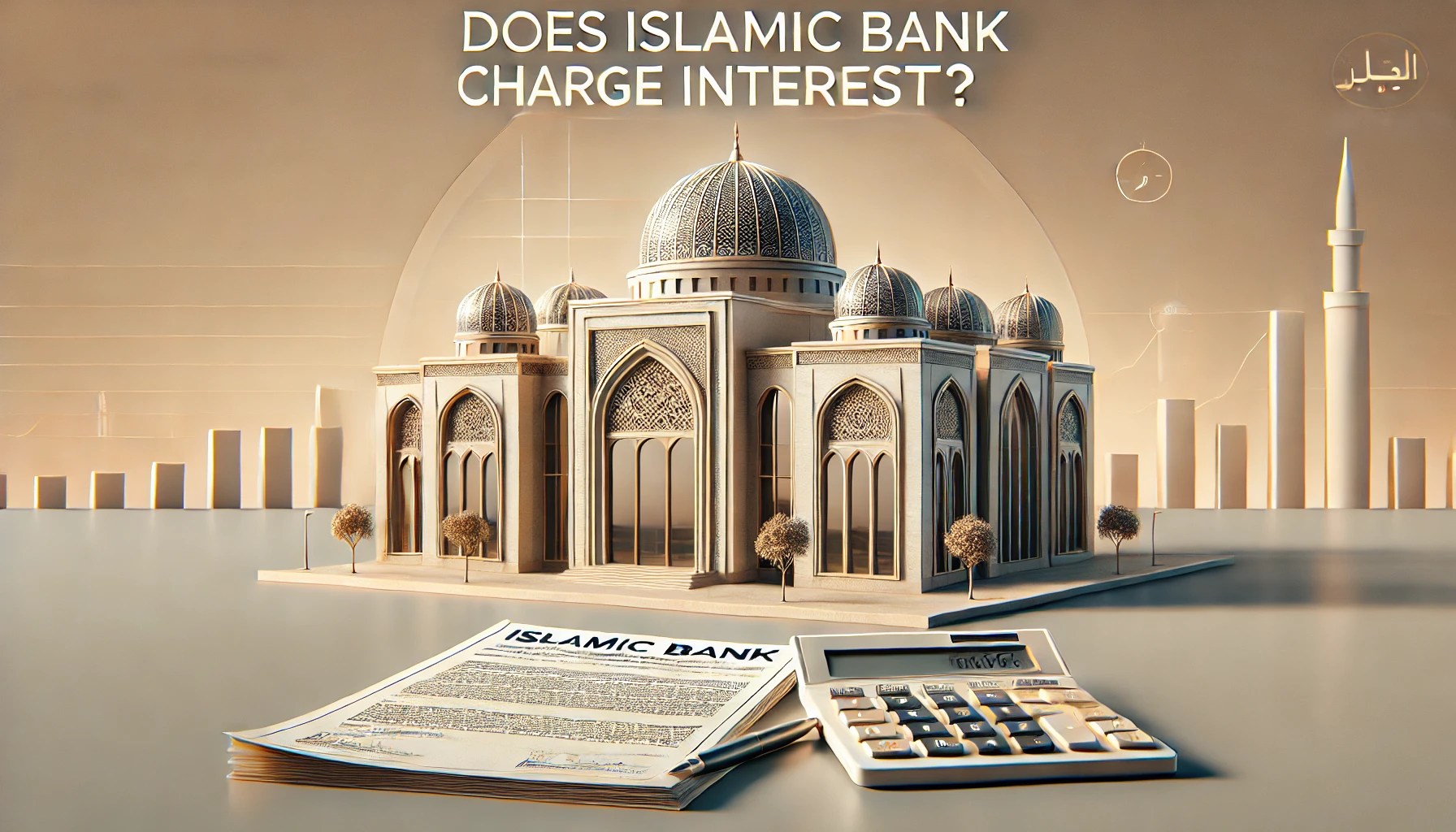Contents
- 1 Introduction on Does Islamic Banks Charge Interest?
- 2 What is Islamic Banking?
- 3 Does Islamic Banks Charge Interest?
- 4 How Do Islamic Banks Make Money?
- 5 How Do Muslim Banks Make Money?
- 6 Muslims and Interest: What Does Islamic Law Say?
- 7 Why Choose Islamic Banks Over Conventional Banks?
- 8 Conclusion on Does Islamic Banks Charge Interest?
- 9 FAQs on Does Islamic Banks Charge Interest
Does Islamic Banks Charge Interest? Discover how Islamic banks operate without charging interest, focusing on ethical, Shariah-compliant financial structures like profit-sharing and leasing. Learn how Islamic banks make money and why they are a popular choice for Muslims seeking interest-free financial services.
Introduction on Does Islamic Banks Charge Interest?
Islamic banking has grown in prominence over the past few decades as a viable alternative to conventional banking, especially in Muslim-majority countries and among communities interested in ethical finance practices. However, one common question that arises about Islamic banks is whether they charge interest, which is a central feature of conventional banking systems. In this blog post, we will delve into how Islamic banks operate, the principles that guide their financial practices, and whether they charge interest. By the end of this article, you’ll have a comprehensive understanding of the workings of Islamic banks and why they don’t follow the traditional model of charging interest.
What is Islamic Banking?
Islamic banking refers to the system of banking that is governed by the principles of Islamic law (Shariah). Unlike conventional banking, which is primarily based on interest-bearing loans and deposits, Islamic banking operates on principles that promote risk-sharing, profit-sharing, and ethical investments. In Islamic finance, the charging of interest, known as riba, is strictly prohibited as it is considered exploitative and unjust in Islamic teachings.
To understand how Islamic banks operate, it is essential to recognize that they use alternative financial models such as Murabaha, Mudarabah, and Musharakah, which are structured around partnerships, profit-sharing, and asset-backed transactions.
RELATED: How Does Islamic Car Financing Work? A Comprehensive Guide to Sharia-Compliant Vehicle Loans
Does Islamic Banks Charge Interest?
One of the fundamental differences between Islamic and conventional banks is that Islamic banks do not charge interest. This is one of the most common misconceptions about Islamic banking: that it operates like conventional banks but with minor adjustments. In reality, Islamic banks operate under a completely different financial model that adheres to the ethical guidelines of Islam.
The prohibition of riba, or interest, is a key principle in Islamic finance. According to Islamic law, earning profit from lending money and charging interest is considered exploitative and unjust. As a result, Islamic banks must structure their financial transactions in ways that do not involve interest but still allow them to generate revenue.
Instead of charging interest, Islamic banks make money through alternative structures, such as leasing, profit-sharing agreements, and trade financing. These methods are grounded in real economic activities, ensuring that the transactions remain ethical and aligned with Shariah law.
How Do Islamic Banks Make Money?
Islamic banks do not rely on the traditional practice of charging interest. Instead, they generate revenue through several alternative financial structures. Let’s explore some of the most common ways in which Islamic banks make money:
- Murabaha (Cost-Plus Financing)
Murabaha is one of the most widely used structures in Islamic banking. In a Murabaha agreement, the bank purchases an item (such as a house or car) on behalf of a customer and then sells it to the customer at a marked-up price. The customer repays the bank in installments, but the price remains fixed and is agreed upon upfront. The markup is not considered interest but a profit margin for the bank.
The key aspect of Murabaha is that the transaction is asset-backed, meaning the bank is involved in the buying and selling of real goods, rather than just providing a loan with interest. This method complies with Islamic law because it is not based on the concept of riba (interest).
- Mudarabah (Profit-Sharing)
Mudarabah is a profit-sharing contract where the bank provides the capital for a business venture, and the customer (entrepreneur) provides the expertise and management. The profits generated from the business are shared between the two parties according to an agreed-upon ratio. However, if there is a loss, the bank bears the financial loss, while the entrepreneur loses only their time and effort.
This method aligns with Islamic principles because the bank is sharing the risk and is not simply earning money from interest or guaranteed returns.
- Musharakah (Joint Venture)
Musharakah is another common structure where the bank and the customer contribute capital to a joint venture. Both parties share the profits and the losses of the business according to their respective contributions. This structure is often used for larger projects like real estate or business ventures.
In a Musharakah agreement, both parties are equal stakeholders in the project, and the profits are shared based on a pre-agreed ratio. Losses are also shared according to the capital contributions.
- Ijara (Leasing)
Ijara is an Islamic leasing agreement where the bank purchases an asset and leases it to a customer for a fixed period. The customer makes periodic payments for the use of the asset, and at the end of the lease, they may have the option to buy it. This structure is similar to a traditional lease or hire-purchase arrangement, but the key difference is that the bank retains ownership of the asset until the lease term ends.
How Do Muslim Banks Make Money?
Muslim banks, like Islamic banks, operate under the same principles of Shariah law. While they may be referred to as “Muslim banks,” the key characteristic is their adherence to Islamic finance principles. These banks do not charge interest but instead generate revenue through profit-sharing, leasing, and asset-backed transactions, as previously discussed.
Muslims and Interest: What Does Islamic Law Say?
In Islam, charging or paying interest (riba) is strictly prohibited. The Quran, which is the holy book of Islam, explicitly condemns interest as an unjust practice. Riba is seen as exploitative because it allows the lender to benefit without sharing the risk or effort involved in the transaction. Islamic law views financial transactions that involve interest as harmful to both individuals and society.
- Quranic Verses on Interest
Several verses in the Quran emphasize the prohibition of riba. For example, in Surah Al-Baqarah (2:275-279), it is stated:
“Those who devour usury will not stand except as stand those who are driven to madness by the touch of the devil. That is because they say: ‘Trade is just like usury.’ But Allah has permitted trade and has forbidden usury.” (Quran 2:275)
- Hadith on Interest
In addition to the Quranic verses, there are also Hadiths (sayings of Prophet Muhammad) that emphasize the prohibition of riba. One such Hadith states:
“Allah has cursed the one who accepts riba, the one who pays riba, the one who acts as a witness to it, and the one who records it.” (Sahih Muslim)
Do Muslims Pay Interest?
In general, Muslims should avoid paying interest because it is prohibited by Shariah law. However, in some cases, Muslims may find themselves in situations where they need to take loans that involve interest, such as when purchasing a home or car. In such cases, many Muslims turn to Islamic banks as a way to avoid paying interest. Islamic banks provide alternative financing options that comply with Shariah law and help Muslims avoid engaging in transactions that involve riba.
Do Muslim Banks Charge Interest?
No, Muslim banks do not charge interest. Instead, they operate under the principles of Islamic finance, using profit-sharing and risk-sharing models to structure their transactions. As a result, Muslim banks ensure that their services comply with Islamic teachings and avoid any involvement in interest-bearing transactions.
The Ethics of Islamic Banking
The ethical foundation of Islamic banking is one of its key distinguishing features. In addition to prohibiting interest, Islamic banking also focuses on ethical investments. Islamic banks are forbidden from investing in businesses or industries that are considered harmful or immoral, such as those involved in alcohol, gambling, or weapons manufacturing. This ensures that the financial activities of Islamic banks align with the values of Islam, promoting social justice and economic fairness.
SEE ALSO: Halal Car Finance: A Comprehensive Guide to Ethical Vehicle Financing
Why Choose Islamic Banks Over Conventional Banks?
There are several reasons why some individuals choose to use Islamic banks instead of conventional banks:
- Ethical Investments: Islamic banks are committed to ethical investment practices, avoiding industries that harm society or the environment.
- Risk Sharing: Islamic banks promote risk-sharing, where both the bank and the customer share the risks and rewards of a financial transaction.
- No Interest: Islamic banks offer a way for Muslims to avoid paying interest while still accessing financial services.
- Transparency: Islamic banks are required to be transparent in their financial dealings, ensuring that all terms and conditions are clearly defined.
Conclusion on Does Islamic Banks Charge Interest?
Islamic banking is a unique and ethical alternative to conventional banking systems. The core principle of Islamic finance is the prohibition of riba (interest), which is considered exploitative and unjust. Instead of charging interest, Islamic banks make money through profit-sharing, risk-sharing, leasing, and asset-backed transactions. These structures not only comply with Islamic teachings but also promote ethical financial practices that benefit both individuals and society as a whole.
For Muslims seeking financial services that align with their religious beliefs, Islamic banks offer a viable and ethical option that avoids the pitfalls of interest-based transactions. Whether you’re interested in personal banking, investment opportunities, or business financing, Islamic banks provide an alternative that adheres to the core values of Islam while also promoting financial inclusion and fairness.
FAQs on Does Islamic Banks Charge Interest
Q1. Does Islamic Bank Charge Interest?
No, Islamic banks do not charge interest. In accordance with Shariah law, the practice of charging interest (known as riba) is prohibited. Instead, Islamic banks utilize alternative methods of financing, such as profit-sharing agreements (Mudarabah), leasing (Ijara), and cost-plus financing (Murabaha), to generate income without violating Islamic principles.
Q2. How Do Islamic Banks Make Money Without Charging Interest?
Islamic banks generate revenue through alternative financial structures that comply with Shariah law. Some of the primary methods include Murabaha, where the bank sells goods at a profit; Mudarabah, a profit-sharing arrangement; and Musharakah, where the bank and customer jointly invest in ventures. These transactions are asset-backed and involve risk-sharing, making them ethically sound according to Islamic finance principles.
Q3. How Do Muslim Banks Make Money?
Like Islamic banks, Muslim banks make money through Shariah-compliant financial structures. They use profit-sharing models such as Mudarabah and Musharakah, where both the bank and the customer share profits and losses based on capital contributions. Ijara (leasing) is also a popular method, where the bank leases assets like property and equipment to customers in exchange for periodic payments.
Q4. Do Muslims Pay Interest on Loans?
Ideally, Muslims avoid paying interest, as charging or paying interest is forbidden under Islamic law. However, in certain situations where no Islamic finance alternatives are available, some Muslims may find themselves in interest-bearing loans. To avoid this, many Muslims seek out Islamic banks, which offer interest-free loans through alternative financing arrangements.
Q5. Do Muslim Banks Charge Interest on Loans?
No, Muslim banks do not charge interest. Instead, they offer financial products that comply with Shariah law, using methods like Murabaha, Ijara, and Mudarabah. These financial products are structured to avoid interest while allowing the bank to earn revenue through profit-sharing or leasing arrangements.
Q6. What is the Difference Between Islamic Banks and Conventional Banks?
The primary difference between Islamic banks and conventional banks is that Islamic banks operate without charging interest, in accordance with Shariah law. While conventional banks offer interest-bearing loans and savings accounts, Islamic banks use alternative structures such as Murabaha, Mudarabah, and Ijara to ensure that their services align with Islamic principles, which emphasize fairness, risk-sharing, and ethical investments.
Q7. Is Islamic Banking Ethical?
Yes, Islamic banking is rooted in ethical principles, as it prohibits investments in industries considered harmful or immoral, such as alcohol, gambling, and weapons manufacturing. Shariah-compliant financial systems emphasize transparency, fairness, and social justice. Additionally, since Islamic banks avoid charging interest, they focus on real economic activity and risk-sharing, making them a more ethical option than traditional interest-based financial systems.
Q8. What is the Role of Shariah Law in Islamic Banking?
Shariah law plays a fundamental role in Islamic banking, as it dictates the rules and ethical guidelines for financial transactions. Riba (interest) is strictly prohibited under Shariah law, and Islamic banks must ensure that their financial products and services comply with these laws. This involves using alternative methods, like profit-sharing and asset-backed financing, to ensure that transactions are fair, transparent, and ethical.
Q9. Can Muslims Use Conventional Banks?
While Muslims can technically use conventional banks, many choose not to due to the prohibition of riba (interest) in Islam. For this reason, many Muslims turn to Islamic banks or Shariah-compliant financial institutions that offer interest-free banking products. However, in the absence of Islamic banking services, some Muslims may reluctantly engage with conventional banks, particularly in non-Muslim-majority countries.
Q10. What Are the Benefits of Islamic Banking?
Islamic banking offers several benefits, particularly for those who wish to align their financial activities with Islamic principles. Some advantages include the avoidance of interest, which is prohibited in Islam, and the promotion of ethical investments. Islamic banks focus on profit-sharing and risk-sharing, ensuring that both the bank and the customer have a stake in the success of financial ventures. Furthermore, Islamic banks often avoid investments in harmful industries, promoting social responsibility and ethical practices.


